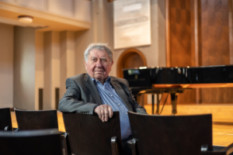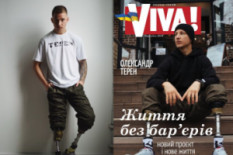After treatment in Ukraine, Teren underwent rehabilitation in the United States and began walking with prostheses. In the fall of 2023, he won a bronze medal for the 50-meter freestyle at the Invictus Games and presented his first book, The Story of a Stubborn Man. Oleksandr also took part in a choreographic performance by the United Ukrainian Ballet in California.
He visited London to pitch the documentary Front Row, produced by Sarah Jessica Parker.
Oleksandr gave an interview to the Ukrainian celebrity magazine Viva about life after the war, his YouTube project «Legs off, or All Inclusive» and overcoming barriers in space and mind. We offer a slightly shortened version of the interview.
During the full-scale war in Ukraine, the number of amputations has reached the scale of the First World War. According to unofficial data, it is about 20-50 thousand people, but the exact number is difficult to calculate due to the intensity of the fighting.
Returning to civilian life, veterans face many problems, including the lack of inclusive space for people with disabilities, lack of understanding of society, and problems with obtaining social benefits.
So the conversation started with the issues of barrier-(free).
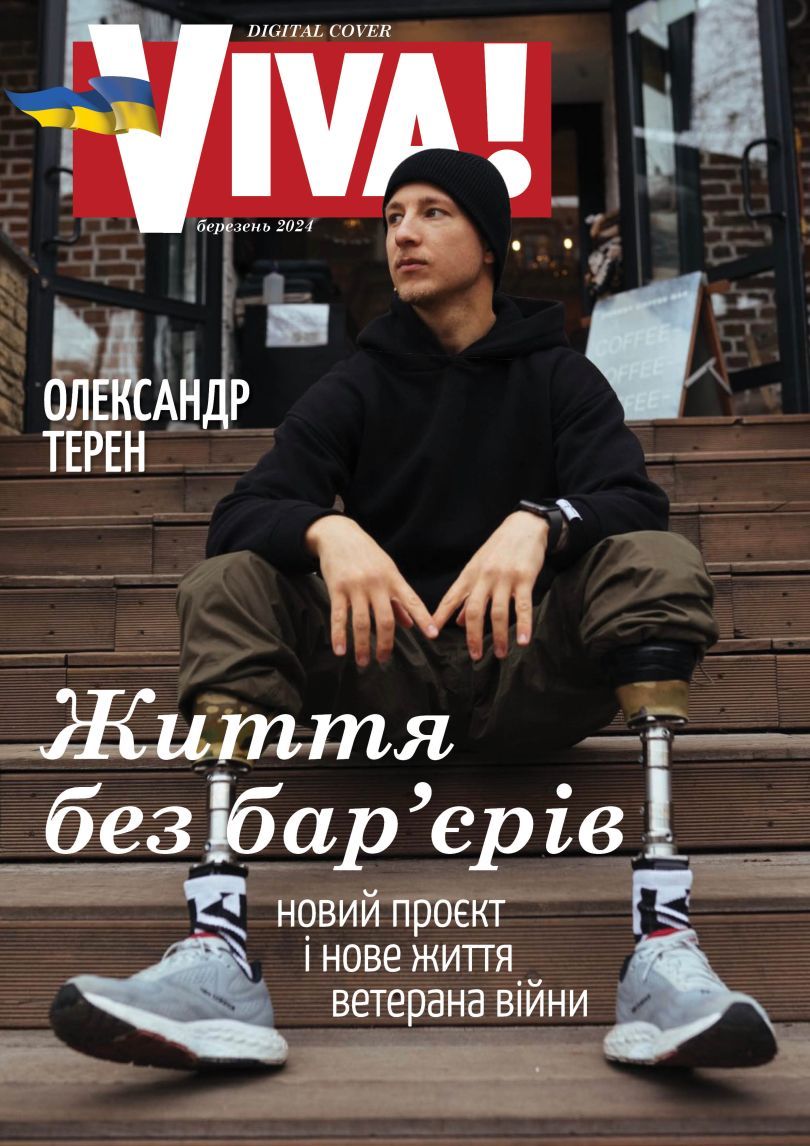
— What city do you live in now? Tell us about its level of accessibility.
I live in the capital. It's quite difficult to talk about barrier-free Kyiv, because the city has many old buildings that, according to our legislation, cannot be changed, meaning that they cannot be made more accessible for people with different types of disabilities. However, even new buildings and places are not taken into account enough to be made barrier-free. For example, brand-new shopping centers cannot be inaccessible, so they try to equip them with elevators. And this is already a must-have, because elevators are used by absolutely all groups of people with limited mobility — mothers with children, pregnant women, elderly and so on. If we talk about the city center, there is almost nothing equipped there. To get into the subway, there is no elevator, and the ramps, or exits from the stairs, are at a high angle, so it is quite difficult to get into the subway on Khreshchatyk or Maidan. There are few metro stations with elevators in Kyiv. Ground transportation is also difficult, because there are still many vehicles that are not accessible. And for a person in a wheelchair to get on buses, you have to ask for help. So, in general, Kyiv is still almost inaccessible, and we have to work harder.
— How much did your life change after losing your legs?
My life changed completely after the invasion, even when I was with my legs. I chose a completely different vector of movement — when the great war had just begun, I chose the path of the military and had all the opportunities and hopes to develop in this profession. I planned to build a career in the military and signed a contract. I wanted to become an officer and continue my service. But as fate decided otherwise, I got wounded and started working in the public sector. Fortunately, a lot of people supported me and my initiatives, so I manage to achieve good results and have a positive impact on society.
So yes, life has changed. The worst thing is that I can no longer hold a weapon in my hands. I only help financially, as much as I can, to my fellow soldiers or just friends or people who ask me to help with the training.
— «It annoys me when people look at me with sympathy and sigh», «We are people like everyone else, we are not special», «What kind of disabled person am I? I just have one limb missing, but I am a completely normal, healthy man», «I want people to be proud, not to say: «It's your fault, because you went there yourself», «Children call me RoboCop», «I feel like a full-fledged person, like everyone else» — these are quotes from the heroes of the «Viva! The Victors» special project about ATO soldiers and volunteers who lost their limbs during the events in the east of Ukraine. Have you felt a change in people's attitude towards you? Is there anything that has impressed you, both positively and negatively?
Of course, the attitude has changed. If we talk about positive changes, many people have begun to show respect and empathy. If we talk about the negative consequences, there is nothing that I really dislike. It is clear that people try to show their empathy and feelings in different ways. Some people offer money, some people forcefully offer some kind of help, and this, of course, is not very pleasant. Sometimes people ask not very polite questions without thinking about how the person will feel. So there are really both positive and negative emotions.
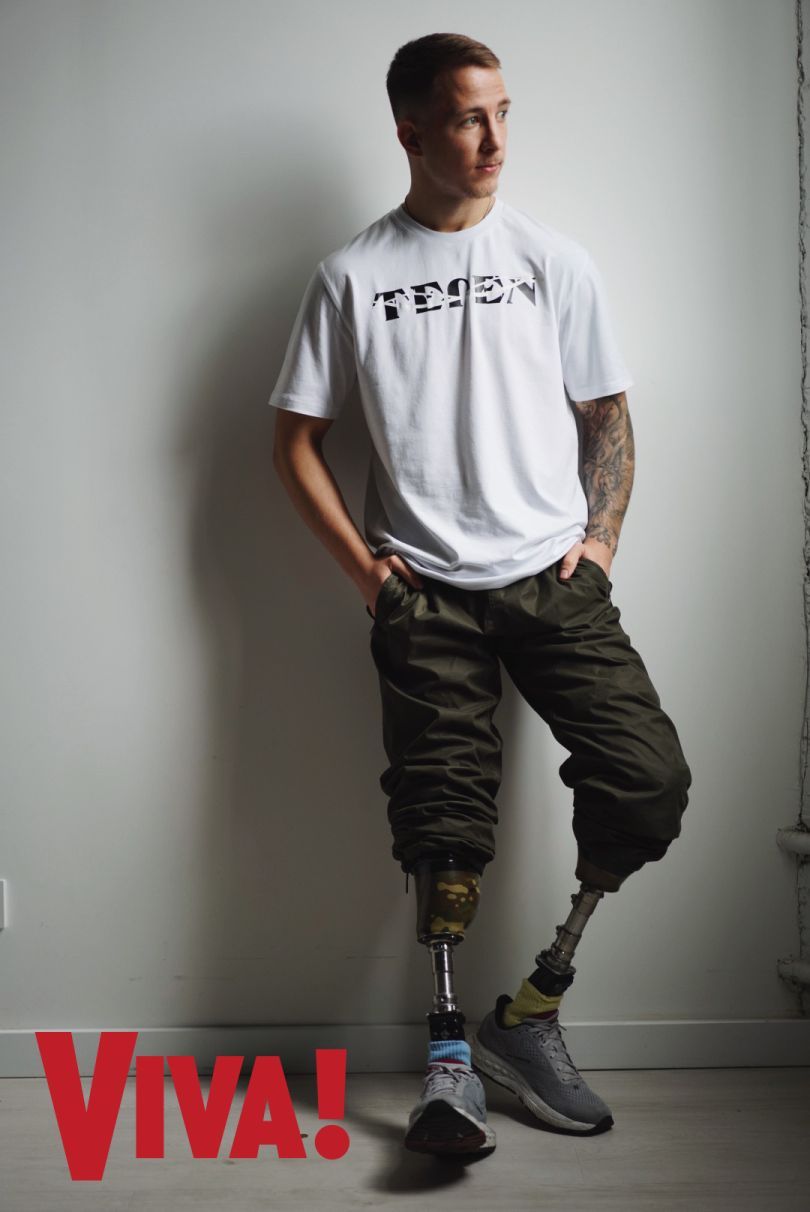
— Sarah Jessica Parker became the general producer of Front Row, a documentary about Ukrainian ballet dancers in exile. Tell us about the film, what is your role in it and your personal experience?
It's a documentary that tells about the war in Ukraine through the prism of culture and ballet. It so happened that I met the United Ukrainian Ballet, and we developed friendly relations, in particular with the soloist of this group, Oleksiy Tiutiunnyk. We are still friends and create something together from time to time. When we first met, I suggested that we make a production. Even then, a movie was being made about them and the war, and the film crew decided to change the vector of the movie a bit — to shoot more about our friendship, my story, how I got into ballet and how I expressed myself through it. In fact, I conveyed a lot of emotional things to the American public.
And when the movie was shot, I found out that Sarah Jessica Parker would become the general producer. Now I'm on my way back from London, where the movie was pitched to film bookers, people who buy movies from different platforms and cinemas. I hope that very soon the film will be screened at various movie festivals, and then we will be able to see it on the big screens.
Speaking about the emotional state, the movie touched me extremely deeply. Even though it is a documentary, they tried to make it as interesting and emotionally colored as possible. There is nothing fictional in it — everything is true, all the events happened in reality, but the metaphors that the authors used in the film resonated with me personally. I definitely recommend watching it.
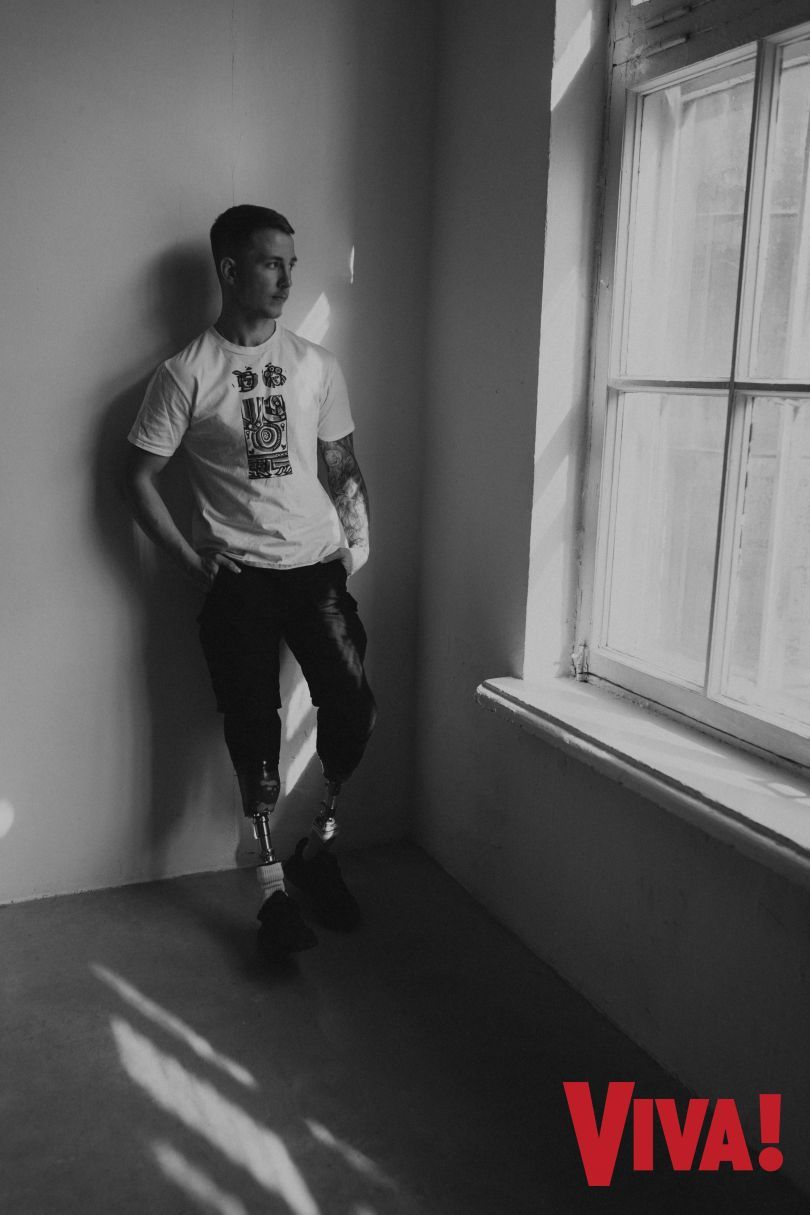
— How did you come up with the idea for the program «Legs off, or All Inclusive»? Who came up with the name, and what other options were there?
I had an initial idea to create a sports program and invite various famous people. But it didn't work out, so I rejected the idea. Natalia Garipova aimed to create a program that would allow people with disabilities to feel free in our country, to have no barriers, to move independently and to serve themselves fully. She came up with this format of an inclusive entertainment travel show. The phrase «Legs off» has been in my vocabulary for a long time, I use it quite often. And «All Inclusive» was added by the scriptwriters, so we decided to make it a complete title.
— How did you choose your media friends, and why did they become participants in the show?
I picked my co-hosts by acquaintance and friendship. We have known Vasyl Baidak for a long time and are quite close, so it was an obvious choice that he would be the first guest. I realized that Masha Yefrosynina resonates with the issues, so we invited her as well. She gladly accepted, which made me happy. We also invited other people because they are concerned about inclusivity and barrier-free access, and they openly communicate about it.
— What challenges do people with disabilities face when traveling in Ukrainian cities?
First, it's traveling alone, because if you're not in your own car, or, for example, it's not equipped for you, it's already a challenge. Public transport is not equipped for transportation. We all know that even a healthy person has a hard time getting on an Ukrzaliznytsia train. It's quite high, steep stairs. There is a ramp that is supposed to be installed, but even a person in a wheelchair cannot get on it by himself. So either you have to be carried in, or you have to be pushed up this ramp at a high angle. In the compartment, a person with a disability can feel fine, the seats are comfortable, but you still need to think about where to put the wheelchair if you are not traveling alone or with your friends, so that it is comfortable for others.
Sometimes I have to climb up to the top shelves and drop my prostheses there, because I'm a little scared that they will be stolen. These are not sneakers, of course, but they are more expensive than sneakers. It's scary to get off, or rather not to get off the train. So, in general, it's hard to travel.
— How does your show influence the viewers' awareness of barrier-free issues? Do you remember anything from the comments?
The show really affects the consciousness of people who watch these episodes, because a lot of people say that they hadn't even thought about how difficult it is for people with disabilities, and they started to notice inaccessible places. Ukrainians write from all over the world that they are watching this program, paying attention even abroad, sending photos of inaccessible places in Europe.
It's nice that people watch and care. The episodes are followed by a big wave of changes, at least in people's minds. We see certain reactions from city authorities and public activists. It didn't take long for us to see that their statements became reality. There are indeed shifts, but we will see whether they will come to the physical world over time.
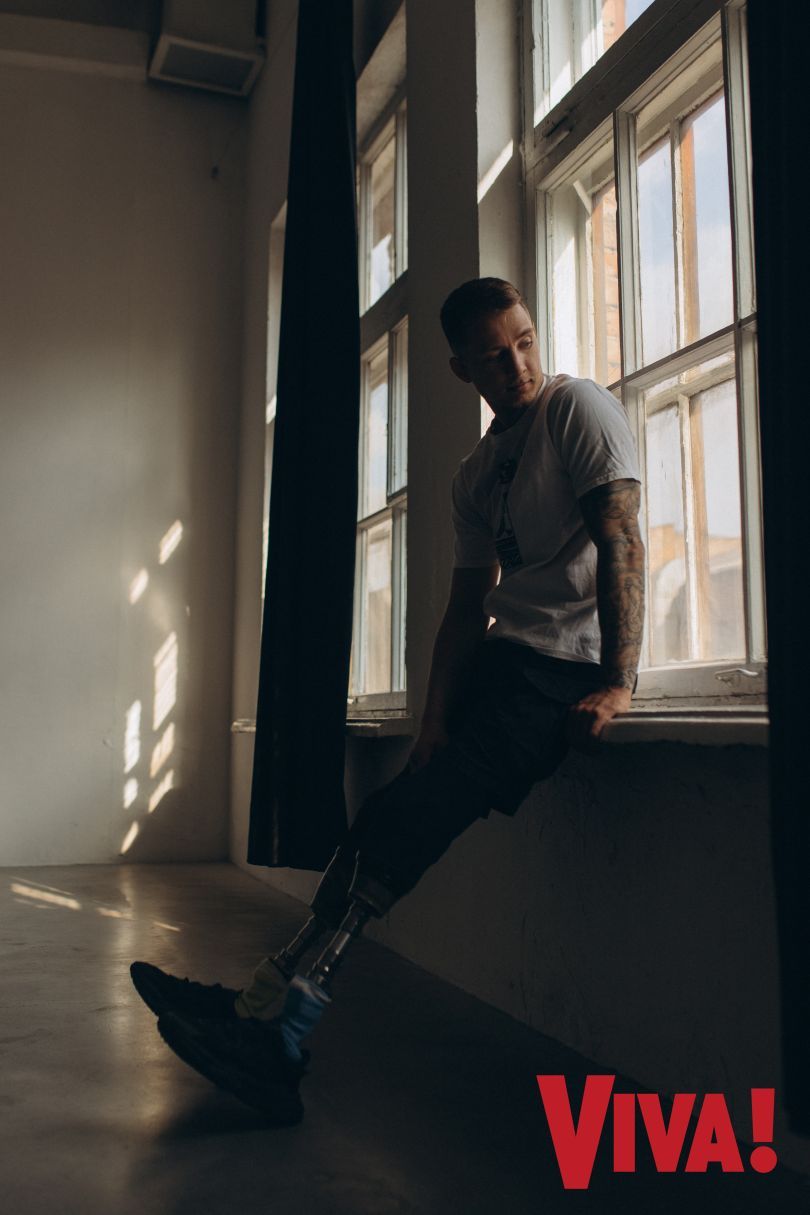
— What was the most interesting or emotional moment of the program for you personally?
One of them was when I went adaptive skiing in Bukovel, and Vlad Khilchenko will make a separate video about it. It was an incredible experience! Realizing that you are skiing without legs, touching this snow, it glistens in the sun - these are very, very good emotions. You're going down at high speed, avoiding people, avoiding the chasm... It's very cool!
When we were filming the episode with Sasha Zaritskaya, she sat in a wheelchair for the first time and went down Andriyivskyy Descent — it was very scary for me personally. I was really worried about her. She was flying down those stones, those big cobblestones, without fear, and I wanted to get up and catch her. It's great that she wasn't afraid and gave us such emotions. I hope the audience will feel them too.
In each program, we don't just ride in wheelchairs and explore barrier-free access — there's so much more to this concept! It's about overcoming barriers in space and in the mind. And there are also emotional moments when strangers come up to you on the street and thank you. Especially if they are children.
— What words from the inclusivity dictionary should every Ukrainian know?
The first thing is to remember what can be generalized. For example: not «blind», «deaf», «lame», «legless» but «person with a disability». Not «blind», but «a person with a visual impairment», not «deaf», but «a person with a hearing impairment». People often say «wheelchair bound», but there is a definition in the dictionary of inclusiveness — «wheelchair user» I think that it will not be difficult for anyone to learn and use this pair of words.
In general, I advise you to look at the dictionary of inclusivity and read a little, go deeper. It's not so difficult to learn a few phrases, and it will help break down barriers not only for people with disabilities but also between people with disabilities and society in general.
— What plans do you have for the future? What do you dream about?
I want to develop in the media sphere, create my own products, develop internally and develop my own brand. I also want to create some kind of accessible business that will be created by people with disabilities. I want them to feel fulfilled and able to create their own business. I want to turn this into a franchise so that people can realize themselves in their cities.
Sport is also present in my life. I won't say that I want to become a professional athlete, but I want to perform and show results. Especially if I am good at it. When I have the time and space, I train all the time.
As for my dream, it's to act in a feature film. I don't know if the role will be adapted for me, but I would just like to try to play someone. For now, it's really just a dream. Sometimes a dream must remain a dream.
Author of the text: Lyudmila Gritzfeldt
